Infinite Injustice: Why it’s Impossible to #RestoretheSnyderVerse
Ray Fisher is Not in a Fight with Warner Brothers…
Ray Fisher is Trying to Get Warner Brothers to Stop Hitting Itself
In October of 2016, AT&T offered to acquire what was then known as Time Warner in a merger that would defeat a federal antitrust challenge in 2017 and complete in 2018. The new overall entity would be known as WarnerMedia and operate under the direction of AT&T as the parent corporation. It is this vast media conglomerate that assembled the launch of the HBO Max streaming platform.
On May 20, 2020, the dedication of the fans pushing WB to #ReleasetheSnyderCut would finally pay off with the announcement of the release of Zack Snyder’s Justice League as an HBO Max Original scheduled for March 18, 2021. Faced with a global shutdown of all active production due to the pandemic, the fledgling streaming service found itself struggling to line up new content to draw subscribers. It’s own production studio, named WarnerMax, had only been formed in February right before the pandemic.
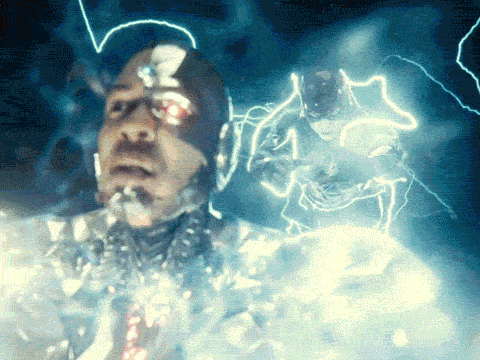
Arguably, it’s possible that Zack Snyder’s Justice League is the only production to ever be released by WarnerMax. In October of 2020, Emmerich would consolidate his power and dissolve WarnerMax, moving all original streaming motion picture production under his auspices at Warner Brothers Pictures, with two production executives leaving the streaming service as a result. This would give Emmerich full control over the production and release schedule for content in both theatres and the streaming platform under the direction of Ann Sarnoff, chair and CEO of WarnerMedia Studios and Networks Group.
Without significant evidence, I’ll tell you right now I’m confident in speculating that Emmerich’s motivations in this decison reveal his disgruntlement with either the cost or the content—or both—of that single WarnerMax production.
On November 18, 2020, exactly one year after the day Emmerich reached out to the Snyders to finally acquiesce and ask about releasing the Snyder Cut, WB would announce the long-rumored release of Wonder Woman 1984 on HBO Max on the same day as its release in theatres.
This situation was not ideal for the film or the studio, and couldn’t be helped due to the pandemic. But was the date of the announcement just a coincidence? Or was a message implied, now that the upcoming Snyder Cut had just lost its position as the only unique live action DC cinematic content to debut on the service?
“I don’t want to get in trouble either, but I’m not going to sit here and let them act like that and not… Look, they’re the ones that have been aggressive, not me. I haven’t done anything. Every day they’d turn around and do some weird passive-aggressive thing.”
Zack Snyder interview on completion of ZSJL with Mike Ryan of uproxx.com – Zack Snyder On Getting Back To Basics With ‘Army Of The Dead’ After What He Calls ‘Torture’ – May 14, 2021
WW84 would soon lose its uniqueness in the situation as, on December 3, 2020 in response to the antipicated reduced capacity operation of nearly all theatres throughout 2021, Warner Brothers would announce Day One releases of all of its upcoming theatrical films directly to the streaming platform. There was, at the time, a great deal of speculation as to the inter-division poltics within WarnerMedia that informed this decision; WB found itself experiencing a great deal of pushback from theatrical directors unhappy with their films debuting on streaming platforms and bypassing the window of box office exclusivity. Christopher Nolan would infamously insist on theatrical release for his eagerly anticipated Tenet, only to discover hubris and failure in empty movie theatres.
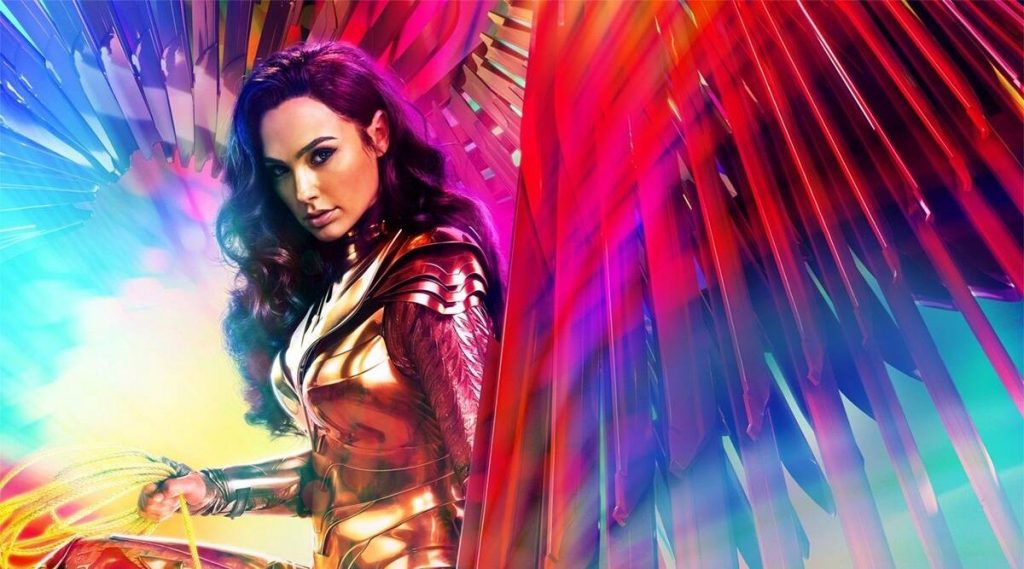
Wonder Woman 1984 by contrast would release Christmas Day 2020 on HBO Max for no additional charge to subscribers, with only minimal theatre screenings. Zack Snyder’s Justice League would not see theatres at all and release exclusively on the streaming service on March 18, 2021. As a result, only the executives at WarnerMedia have the data to make direct viewership comparison between the two films. They are able to hide this direct comparison between these films and all others before or since, in a way they never have been able to before.
But WW84‘s critical drop from its predecessor would stand in contrast to the 71% critic rating ZSJL would achieve, raising its score from the 40% critic rating on aggregator Rotten Tomatoes for the theatrical release of Justice League. And the public discourse on Wonder Woman 1984 would be dismal.
For a time, vociferous proponents of #RestoretheSnyderVerse, struggling as much as I am in this article to sort out the shifting and convoluted WB corportate hierarchy, were hoping for some sort of massive dramatic change in direction determined by the “big bosses at AT&T” in response to the controversial decisions revealed by the conflict… and in response to the disparity in quality between the direction Emmerich and Hamada were taking DC Films as expressed in Wonder Woman 1984, and the direction long abandoned as expressed in Zack Snyder’s Justice League.
Although this campaign to #RestoretheSnyderVerse may align with Ray Fisher’s career interests if you presume he is interested in continuing to play Cyborg for WB, it’s only aligned with Fisher’s commitment to value Accountability Over Entertainment if the people responsible for Fisher’s experience face consequences for their actions. But instead, by this point, the decision-makers that Fisher would have face consequences have received a public statement of support in the matter from the CEO of WarnerMedia organization. And Fisher would be committed to A>E so much so that there is no future anymore with him playing Cyborg for the current command structure at WarnerMedia.
The ugly situation on Twitter between Fisher and the studio would grow uglier in September 2020, when Fisher would call out Hamada over Twitter for his pre-investigation phone call, implicating the executive for attempting to interfere in the investigation. The studio would respond over Twitter, claiming that Fisher wasn’t cooperating in good faith and had to date declined to have contact with the third-party investigator. Fisher would counter with proof of contact between himself and the investigators, although he has also made it clear that he did limit his interaction with the investigators due to the lack of trust in the process seeded by its initiating conversation with Hamada. After WB concluded the investigation and announced their “remedial actions,” Fisher was unsurprisingly unsatisfied, and stated on Twitter he would not work on any productions associated with Walter Hamada. In January of 2021 Fisher would then confirm the severing of his relationship with the studio and the role in an extended statement released also on Twitter, confirming that Warner Brothers had communicated to him that his part playing the role of Cyborg in the long-in-development Flash movie had been removed.
“You really have to ask yourself, what’s more plausible—that I would purposely torpedo my career by making statements about powerful figures in Hollywood, that, if untrue, could be easily refuted. OR a handful people in positions of power said and did terrible things in order to maintain that power during a massive corporate merger.”
Ray Fisher, via Sheraz Farooqi, Forbes – Interview: Ray Fisher Speaks Out On “Toxic” Set And WarnerMedia Investigation Into Justice League Production – Oct. 29, 2020
WarnerMedia in turn revealed determination to support Hamada, Emmerich, and Johns and put the matter to bed. Warner Brothers has committed to public statements claiming that Hamada did not interfere with the investigation, and more pointedly that Fisher is making repeated allegations that are not truthful, as covered by Variety. Contracts for Emmerich and Hamada have been extended with the studio, with Emmerich’s ending in 2022 and Hamada’s in 2023:
This month saw Hamada’s deal with Warner Bros. Extended to 2023.
“Walter is not only passionate about story and the DC canon, he’s also a thoughtful and incredibly talented executive who is fully committed to investing the time and care necessary for moviemaking on this scale,” Warner Bros. Picture Group chairman Toby Emmerich said in a statement. “With Walter overseeing our DC movies for theatrical exhibition and on HBO Max, we are excited for him and his team to bring more of these stories to life, working with new and established talent to broaden the reach and diversity of the DC cinematic universe.”
Emma Nolan, Newsweek – Why Ray Fisher Was Removed From ‘The Flash’ Following ‘Justice League’ Investigation – Jan. 14, 2021
Geoff Johns is still deeply involved in the televised DC adaptatons as showrunner for the Stargirl series and producer for many others, as well as still ostensibly developing Green Lantern Corps for film… although that production has long since gone dark. Johns has been listed (among many others) as producer on an upcoming parallel HBO Max streaming Green Lantern series.
In short, “DC Films” continues its currently planned development slate with the executives currently in place.
“I’m not in a fight with Warner Bros. I’m in a fight with a handful of people that are attempting to use Warner Bros. to cover their tracks. All the significant film and tv work I’ve done has been under the WarnerMedia banner. I love what I do and who I’ve been blessed to do it with.”
Ray Fisher, via Sheraz Farooqi, Forbes – Interview: Ray Fisher Speaks Out On “Toxic” Set And WarnerMedia Investigation Into Justice League Production – Oct. 29, 2020
Fisher is eloquent and determined. And there continues to be more information released by him that seems to paint a picture of an effort by Hamada to cover for Johns, his former co-president, in the investigation. Fisher continues to demand the release of the full information from the investigation, refuting statements by WarnerMedia CEO Ann Sarnoff about the legitmacy of the investigation and Hamada’s role, as covered by Deadine in March of 2021. So, essentially, Fisher has heard this year from the very top of the organization that they’re not pursuing his claims any further. The CEO of WarnerMedia herself is committed to, in Hamada’s words, “get past anything to do with Justice League” now that the Snyder Cut has been released.
This is perhaps unsurprising, considering that despite Fisher’s Twitter focus on Johns, Hamada, and Emmerich and the specific conversations he had with them, at the end of the day the real damning accusation has primarily to do with the whitewashing of the movie:
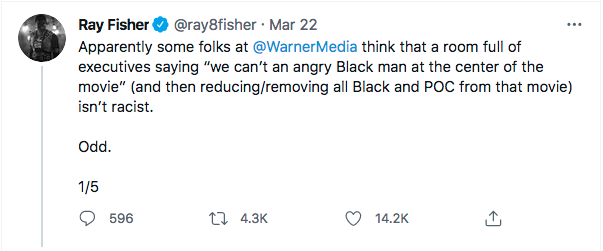
https://twitter.com/ray8fisher/status/1374165899079528448?lang=en
The “angry black man” conversation at Warner Brothers, regardless of who participated and in what way, was a clear failure not only in upholding the progressive values of inclusion the studio publicly espouses, but in achieving the business goal of representing shareholders by presenting good and prescient competition for Marvel’s competing offering. WB management misread the audience so thoroughly they scrubbed an “angry black man” protagonist from their tentpole billion-or-bust superhero film six months before Marvel would pocket another billion dollars with Black Panther.
Of course when Zack Snyder’s Justice League did finally release on HBO Max, it was nearly four hours long. A lot was cut from Snyder’s original footage and script to hit the two-hour mark originally mandated, likely by Kevin Tsujihara so long ago, of the theatrical release. Is it possible that theatrical Justice League was inadvertently whitewashed under direct orders, for time? How could that be, with reported conversations discussing the whitewashing so directly? How could that be, with so many new and additional scenes shot and filmed by Whedon focusing the film on relationship moments between the white principals of the film Ben Affleck and Gal Godot?
Imagine how many of these questions could be answered, with just a a transcipt of this pivotal conversation about the “angry black man.”
“Our investigator, Judge Katherine Forrest, has issued statements specifically about Walter Hamada, saying that there was no evidence of interference by Walter in the investigation. She said that the cuts made in the Joss Whedon version of “Justice League” were not racially motivated.”
Ann Sarnoff, interview with Brett Lang of Variety – WarnerMedia’s Ann Sarnoff on ‘Zack Snyder’s Justice League’ and DC’s Future – Mar. 22, 2021
The hard evidence revealing racially-biased conversations behind-the-scenes that would convince most audiences of Fisher’s contention that the cuts were made for racial reasons has continued to elude him. But this situation continues to evolve, as more information comes out and Fisher retains his determined focus. He continues to find allies and evidence, seeming to invesigate the patterns and culture issues that Warner Brothers themselves have never even addressed with anything but the most boilerplate of corporate inclusion-commitment-language.
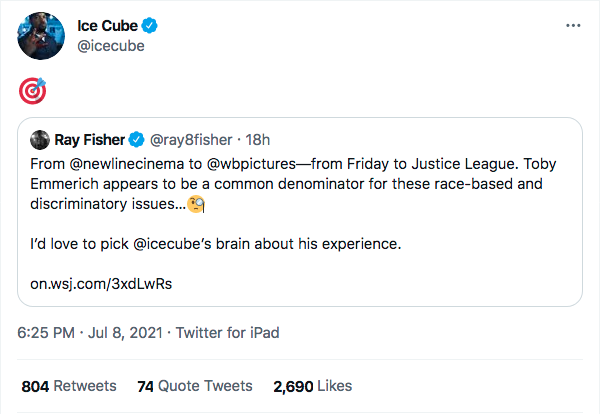
https://twitter.com/icecube/status/1413293234176937988
The disruption of the COVID-19 pandemic has accellerated a transition to streaming release of movies that previously debuted theatrically, even for studios that didn’t take the Day one risk that WB did. It effectively halted all prouction for a while, and slowed and delayed any production that found ways to continue. As a result, this disruption has sapped revenue from these motion picture divisions among their parent companies.
Warner Brothers, at the time of its acquisition by AT&T for $85 billion, was already carrying a fair amount of debt before all this in 2018, owing to their strategy leaning on the DC Films, Lego Movie, and Fantastic Beasts franchises. For a time, it seemed to fans who supported Fisher that the long-entrenched studio power structure at WB might be vulnerable to new oversight by AT&T… so much so that a big enough campaign of outrage and support across both the #IStandwithRayFisher campaign and the #RestoretheSnyderVerse campaign could lead to an ouster at WB.
However, in May of 2021 AT&T would spin WarnerMedia off into a new separate entity, forming a new publicly-traded company, Warner Bros. Discovery, under CEO David Zaslav. In this envornment of additonal change and instability, it seems increasingly likely the new organization will need to keep its established value and persist with its existing power structure and projects in place.
So far, that seems to be the case.
After all, despite the fact that all the DC cinematic adaptations to date have used different production houses and franchise co-captains with no clear creative leadership in production, the decision-making power has all since been aligned under one clear line of executive hierarchy:
“Last August, I was made head of studios and networks and I now have all of the creative groups underneath me, so now around that table it’s not just Warner Bros. film, Warner Bros. television, and Warner Bros. games, but it includes HBO and HBO Max and the Turner networks, Adult Swim, and the Kids and Family networks. We are involving all of those people in our plans going forward and that means the media is going to be more connected, sometimes in subtle ways and sometimes in more overt ways.”
Ann Sarnoff, interview with Brett Lang of Variety – WarnerMedia’s Ann Sarnoff on ‘Zack Snyder’s Justice League’ and DC’s Future – Mar. 22, 2021
Of course, despite the conslidation of executive decision-making (and, perhaps, the intentional insulation of said executive positions) there will be no consolidation and leadership in creative decison-making… at least not from the creator #RestoretheSnyderVerse fans have asked for:
“For certain fans that want singular voices, they may be disappointed, but we would ask them to be patient and see what we’ve got in store because perhaps the newer voices in the mix will have just as compelling stories to tell.”
Ann Sarnoff, interview with Brett Lang of Variety – WarnerMedia’s Ann Sarnoff on ‘Zack Snyder’s Justice League’ and DC’s Future – Mar. 22, 2021
It’s a pretty direct message. The “SnyderVerse” will not be restored.
United We Stand, Divided We Fall
Individually We Decide if it’s Time to Take a Knee
Ray Fisher has long ago turned to the court of public opinion to appeal for support and satisfaction in pushing for transparency and change at the studio. His concerns deserve better consideration than they get in certain forums on reddit, where speculation is rampant about the motivations and biases of the reporters with which he has chosen to share his story, and so on… the typical tactics dissembling and disassembling an account of abuse until the victim is blamed. I see repeated there the same talking point WB themselves released in response to Fisher’s claims: that he is motivated primarily by selfish career concerns, or that he is working with Zack Snyder to wrest control of the DC Films enterprise and direction.
And, to be fair, a lot of the additional footage shot and integrated into the final streaming release of Zack Snyder’s Justice League seemed to be an encapsulation of, or even an appeal for, his original vision for the full DCEU extended storyline. “Sequel bait” as it’s colloquially been named.
“We won’t be developing David Ayer’s cut.”
Ann Sarnoff, interview with Brett Lang of Variety – WarnerMedia’s Ann Sarnoff on ‘Zack Snyder’s Justice League’ and DC’s Future – Mar. 22, 2021
Perhaps the more damaging accusation I’ve seen in online chatter about Fisher, because it is hard to refute, is that he is green and sensitive and relatively unknown, and therefore not a trustworthy judge of professionalism—and one who possibly came into the re-shoot situation with a chip on his shoulder already. On Twitter the response has been a lot more supportive behind the #IStandwithRayFisher hashtag. The Twitter community maintains a greater generalized focus on social justice across enterprises, although there are clearly voices there willing to excoriate Fisher as well as ones willing to give him their support.
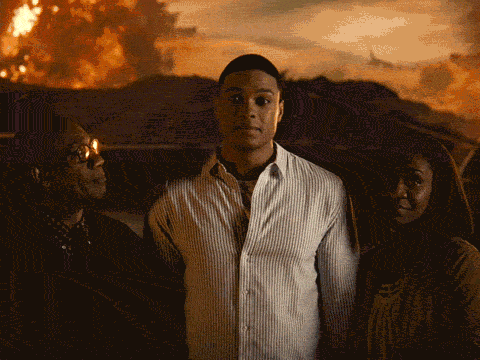
Of course, when it comes to building a consensus of audience and public satisfaction around these films, the damage is done. This split among social media audiences is emblematic of the fresh split in theatre audiences for these movies. Some will refuse to partake in the product that comes out from Emmerich and Hamada’s leadership just to show solidarity via #IStandwithRayFisher. Others will consider Jenkins’ and Johns’ Wonder Woman 1984 the future direction for tone in the DC movies, compare it directly to Zack Snyder’s Justice League, and decline to pursue them further while hoping pointlessly for the restoration of lost serial storyline opprtunities via #RestoretheSnyderVerse. Some others will forgive all past transgressions and turn up for a successful quality DC adaptation regardless of its place in a larger connected universe, as we saw with 2019’s Joker, the second and latest billion-dollar-earning DC adaptation that WB would release.
But regardless of which direction they go, this development splits and diminshes the audience for DC Films.
Perhaps it should… if they indeed continue to benefit studio heads who regularly dispose of fall guys, and retire loyal lackies out to the Arrow-Verse once they’ve used them up in the movie game. Is that impression a fair summary of the executive decision-making careers of either Walter Hamada or Toby Emmerich? Emmerich has twenty years of tenure at the studio: a long and storied career in the industry, seemingly starting decades ago from a position heading music production for film, rising to the role of a decision-maker whose main focus seems to be managing high-level strategy, talent, and budget. His career, like that of Geoff Johns, contains plenty of works upon which he is executive producer that one can argue have expanded diversity and representation in Hollywood. Hamada’s career is shorter, arising from New Line into prominence primarily with his executuve producer role in current and upcoming DC films adaptations.
“Perhaps we’ve lost the plot a little bit which is that Toby and Walter were part of the green-lighting that allowed Zack’s vision to come to life, which includes sharing the full story about Ray’s character. There really was nothing that Walter did against Ray, in fact he offered him a role in the Flash movie.
Walter was promoted recently. I am fully supportive of Toby and Walter and their visions. I truly believe they are great executives. Walter happens to be a person of color, so he knows what that feels like. He is bringing in diverse voices at an accelerated pace, more than anyone has in the past.”
Ann Sarnoff, interview with Brett Lang of Variety – WarnerMedia’s Ann Sarnoff on ‘Zack Snyder’s Justice League’ and DC’s Future – Mar. 22, 2021
I’ve been hearing a lot lately how “people should not be defined by their worst day.” But people commit crimes and offenses all the time on the worst day of their life that define the rest of their life. Just ask Kevin Tsujihara about that. Still, as was the case with the original #ReleasetheSnyderCut campaign, the internet and the court of public opinions does what it does; all these executives I have discussed in this article have experienced a deluge of public derision over their decisions, much of it associated with the #RestoretheSnyderVerse hashtag.
“We’re not tolerating any of that. That behavior is reprehensible no matter what franchise you’re talking about or what business you’re talking about. It’s completely unacceptable. I’m very disappointed in the fans that have chosen to go to that negative place with regard to DC, with regard to some of our executives. It’s just disappointing because we want this to be a safe place to be. We want DC to be a fandom that feels safe and inclusive. We want people to be able to speak up for the things they love, but we don’t want it to be a culture of cancelling things that any small faction isn’t happy with. We are not about that. We are about positivity and celebration.”
Ann Sarnoff, interview with Brett Lang of Variety – WarnerMedia’s Ann Sarnoff on ‘Zack Snyder’s Justice League’ and DC’s Future – Mar. 22, 2021
This is precious. At least twice over, Warner Brothers has been happy to completely reengineer a film out from under a director, releasing it into theatres with the director’s name over the marquee, and allow that same director to field all the same social media outrage and reputational backlash over the results of those decisions. David Ayer’s purportedly final statement on Suicide Squad was very clear about how the theatrical release of the film led to a “tsunami of sometimes shocking personal criticism” that he quietly endured for the studio. He makes it clear how miserable an experience that was for him; he would rather get shot at, which really means something since he outlines a bulk of life experience before screenwriting where that was a very real risk he has already personally experienced (you really should read his whole statement).
No one’s going to deny that the internet’s gotten to be a rough place over the past few years, but everyone’s on the receiving end. These WB production executives, however, were very used to operating anonymously behind the scenes. Warner Brothers has long had a reputation as a “director’s studio” with extraordinary freedom and autonomy traditionally given to its productions, attracting some of the biggest name directors like Christopher Nolan to work with the studio repeatedly. With the “DCEU,” however, directors found themselves relieved of their creative freedom and left only with the autonomy to face the social media backlash on behalf of the decision-makers who overruled them.
In contrast, at Marvel Studios, the very public “franchise captain” Kevin Feige has had his fights with directors as well. The need to establish a running continuity in a consistent world has led to Feige sometimes stifling and changing a director’s creative vision for an MCU film. Thor: The Dark World was originally slated to be directed by Patty Jenkins. In May of 2014, it was announced that Feige would be replacing Edgar Wright as director of Ant-Man, who had been working for eight years on the long-in-development adaptation. In April of 2016, Joss Whedon would admit that the conflict with Marvel would play a role in his disappointment with the film and his departure from working with them on future features in the Marvel Cinematic Universe. Jon Favreau, who helped usher in the existance of the MCU helming the original Iron Man, remains affiliated and is still playing a role in the film series even as he declined to direct the third part. Rumors swirled about conflict over Iron Man 2 leading to this decision, and shortly afterwards he would move on to direct and star in a film called Chef, which some speculate is an allegorical story of his creatively stifling experience directing for Marvel. Most recently, Feige parted ways with Scott Derrickson, the director of 2016’s Doctor Strange, over “creative differences” regarding the upcoming follow-up Doctor Strange and the Multiverse of Madness, replacing him with Sam Raimi.
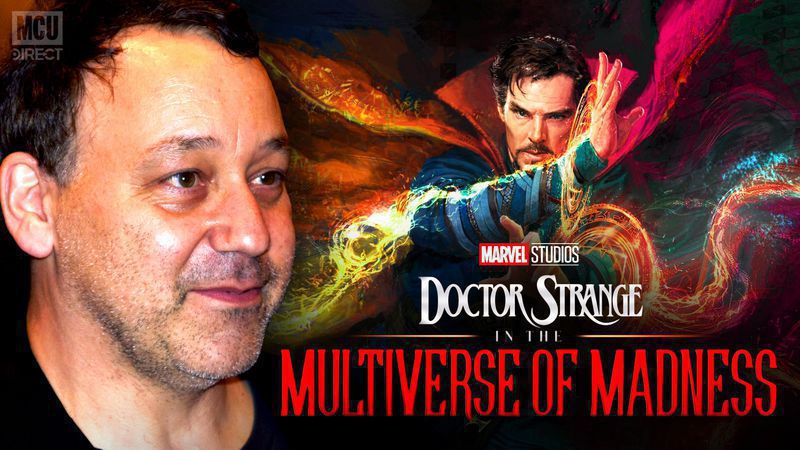
Unlike what we’ve seen at WB, these conflicts have often been expressed and hashed out early in a film’s preproduction, with Feige taking a more direct and hands-on approach to the creative direction of the enterprise. Directors have been replaced, and Marvel movies have even been edited and reengineered later in the proces to the rumored displeasure of directors, but all in the service of the overall plan for the connected serial storyline that would become one of the core tenets (if you will) of the Marvel Cinematic Universe. It is the long term expression of the franchise that itself becomes the most effective counter-argument for any individual director or actor beef with the creative direction of an individual movie. There is a vision, and whether creatives agree with a vision or not, they respect the presence of one.
The vision at DC Films seems to be an arena of directors and producers still auditioning—fighting against each other for dominance at the behest of arenamasters, who wait to award the prize of limited and revokable creative freedom and direction to the financial winner of the bloody elimination.
Marvel Studios has had its share of fights with actors as well, recasting roles as a result. Terrence Howard was famously replaced by Don Cheadle in the role of Colonel James Rhodes for Iron Man 2, after an ugly contract and payment dispute that would see the Oscar-nominated actor eventually throwing some shade at Robert Downey Jr over the outcome. Edward Norton would be replaced by Mark Ruffalo in the role of Bruce Banner after The Incredible Hulk when the character would return for The Avengers, with some acrimony reported between Feige and Norton over the parting comments.
Thus far, these MCU conflicts with actors have been with major headlining players. Howard and Norton both had significant film accomplishments under their belt beforehand, and the ability to recover and continue to find work of their choosing afterwards.
With Ray Fisher and his conflict with Warner Brothers, a young and relatively unknown black actor was centrally featured in a multi-million dollar tentpole film as it was originally shot, and then called back for re-shoots that drastically hurt not only the quantity but the quality of his performance… and thus his ability to continue to find work. Cyborg’s final arc in theatrical Justice League is a ridiculous flip-flip from serious and dramatic Snyder footage to the jokes and the catch-phrase footage wedged in by Whedon. Although arguably every actor’s character portrayal suffers in the the re-shoots, only Fisher has experienced a sparse filmography in the time since.
Although it was good of Toby Emmerich and Walter Hamada to—as part of a larger decison-making team of executives that has since grown smaller—finally allow Fisher’s moving and confident performance of Cyborg’s origin character arc to see the light of day, its disinegnuous to claim any credit for the decision. It was the chorus of the #ReleasetheSnyderCut hashtag, combined with the unique needs and challenges of the new streaming service’s dearth of content amidst a pandemic, that led to the redemption of Ray Fisher’s Cyborg. The release of Zack Snyder’s Justice League on HBO Max, without the names of Jon Berg and Geoff Johns in the production credits, is a redemption for Fisher’s layered and emotional performance and the character’s place front-and-center in the film.
By the same token, touting the offer from Hamada for Fisher to reprise the role of Cyborg as generous rings similarly hollow… if the role is a consolation prize for work the actor hadn’t been able to secure in the time since Emmerich’s decisions soured audiences to his abilities in the first place.
In the end, we’ll never know how things might have been different for Fisher if Snyder had been able to find a way to release some version of his film featuring Fisher’s original performance through Warner Brothers theatrically in 2017. What we do know, for an indisutable fact, is that the reengineering of Justice League by WB prevented Ray Fisher’s Cyborg from being the first black superhero featured prominently with a central character arc in a tentpole theatrical DC Film.
WB seems to know it too, as they’ve immediately set about refuting this very effective point… by providing exactly that.
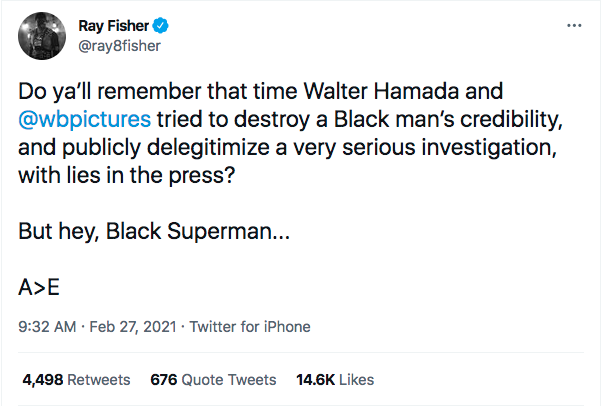
https://twitter.com/ray8fisher/status/1365701283303284737
Advertisement

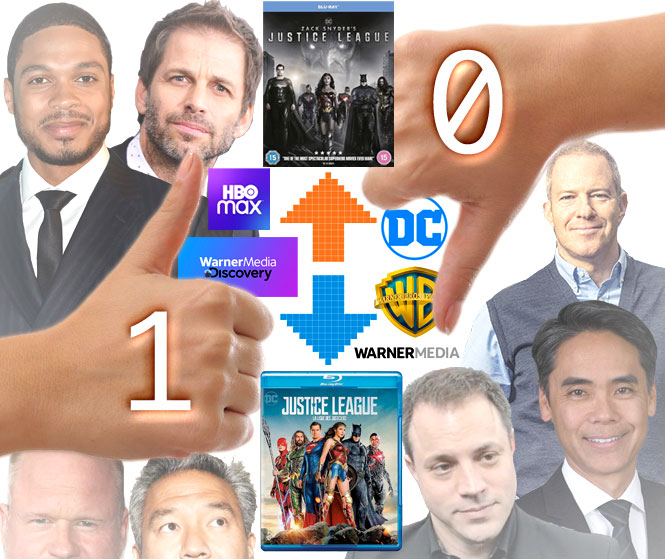
One thought on “Infinite Injustice: Why it’s Impossible to #RestoretheSnyderVerse”